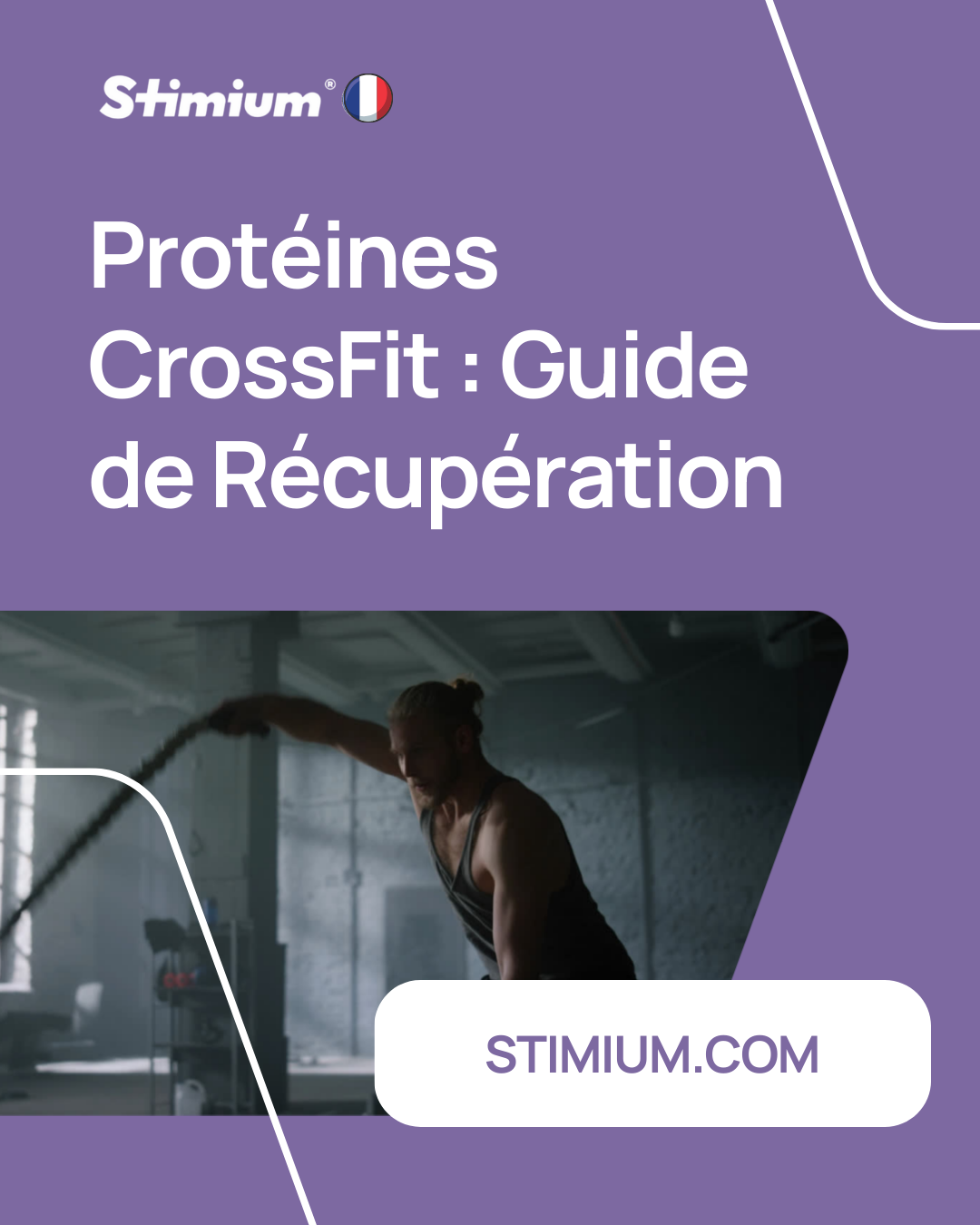Choose Our Crossfit Food Supplement For Optimal Performance
Dietary supplements play an essential role in the performance and recovery of crossfit athletes. At Stimium, we offer a food supplement specially designed to meet the needs of crossfit athletes. Our products are formulated with high quality ingredients, scientifically proven to improve performance, promote recovery and support a balanced diet suitable for crossfit training.
Our crossfit athlete supplements are carefully developed to provide essential nutrients needed by your body during intensive training and competitions. Whether you need a crossfit performance booster, crossfit vitamins and minerals or crossfit sports nutritional supplements, we have what you need.
We understand that every crossfit athlete has different needs. That's why our dietary supplements offer a variety of options to meet your specific needs. Whether you are looking to increase your muscle strength, improve your resistance to exercise or promote muscle recovery, our range of crossfit performance products has everything you need to achieve your goals.
Main findings
- Dietary supplements are essential for crossfit athletes
- Our food supplement is specially formulated for crossfit athletes
- Our products improve performance, promote recovery and support a balanced diet
- We offer a variety of options to meet the specific needs of each athlete
- Achieve your crossfit goals with [Brand Name]
Fundamental supplements for crossfit
To optimize your performance and promote adequate muscle recovery as part of your crossfit practice, certain food supplements are essential. Among these supplements, we particularly recommend creatine, beta-alanine and BCAAs (branched chain amino acids).
- Creatine is a supplement that has been extensively studied and proven to have beneficial effects on muscle strength and muscle growth. It acts by increasing the synthesis of phosphorylcreatine, which improves performance during intensive training.
- Beta-alanine is another essential supplement for crossfit athletes. It acts by reducing the accumulation of lactic acid in the muscles, which improves resistance to exercise and delays the onset of muscle fatigue.
Finally, BCAAs, or branched chain amino acids, are also very important for crossfit practitioners. They play a key role in preserving muscle mass during intense efforts and help promote muscle recovery after training.
It is important to emphasize that these food supplements should always be used in addition to a balanced diet, which remains essential to provide your body with all the nutrients it needs. They should in no case replace a healthy and balanced diet.
Supplements for crossfit training
In addition to basic supplements, there are some supplements that can be used to enhance crossfit training. These supplements are specially designed to meet the needs of athletes practicing this demanding sport. Whether to optimize performance, promote recovery or prevent injuries, there are options suited to every goal.
- Carbohydrates play an essential role in the energy supplied to the muscles during exercise. Organic oats and cluster dextrin are two carbohydrate sources commonly used by crossfit athletes to quickly provide usable energy to muscles and promote recovery after exercise.
- Protein is essential for protein synthesis and muscle repair. Dietary supplements such as Diet Blend, which contains different high-quality protein sources, can be used to stimulate muscle growth and promote better recovery after intensive training.
- Caffeine is a popular pre-workout among crossfit athletes. It is known to improve performance by increasing alertness, reducing fatigue and promoting concentration. However, it is important to take into account its effects on sleep and not overuse it, so as not to disrupt rest and recovery.
- Omega 3s are essential fatty acids including EPA and DHA that have beneficial effects on general health, muscle recovery and mood. Dietary supplements containing these fatty acids can be used to supplement the diet and support performance and recovery in crossfit athletes.
Finally, joint protection supplements play a crucial role in preventing injuries and maintaining joint and tendon health. Type 1 collagen is particularly renowned for its beneficial effects on the protection and regeneration of joint tissues.
To optimize your crossfit training, it is important to choose the food supplements adapted to your specific needs. By combining fundamental supplements with those that match your personal goals, you can improve your performance, promote recovery and support your body in the physical demands of crossfit.
The importance of vitamins and minerals for crossfit athletes
Vitamins and minerals play an essential role in the performance and recovery of crossfit athletes. To guarantee optimal muscle recovery and limit the appearance of nighttime cramps, it is important to have a sufficient intake of vitamins. These nutrients also help prevent certain deficiencies and maintain a good nutritional balance.
Sweating during crossfit training leads to a loss of minerals, such as magnesium, zinc and calcium. Daily consumption of multiminerals helps compensate for these losses and limit muscle inflammation. By ensuring adequate mineral intake, crossfit athletes can avoid metabolic disturbances and optimize their performance.
Omega 3, for their part, is recognized for its beneficial action on blood circulation, muscle pain and recovery. They play a key role in the optimal functioning of the cardiovascular and nervous systems.
To ensure that the body has all the nutrients necessary for optimal performance, it is possible to use food supplements containing vitamins and minerals specific for crossfit athletes. These supplements are designed to meet the specific nutritional needs of this intense sporting activity.
Recommendations for a balanced diet in crossfit
In addition to food supplements, a balanced diet is essential for crossfit athletes. To provide our body with all the nutrients it needs, it is important to eat a variety of foods. This ensures adequate intake of macronutrients and micronutrients.
For crossfit athletes, certain nutrients are particularly important. For example, magnesium plays an essential role in the mechanisms of muscle contraction and stress management. It is therefore beneficial to include foods rich in magnesium in our daily diet.
Omega 3s are also essential for crossfit athletes. They have beneficial effects on blood fluidity, cardiovascular health and the nervous system. It is recommended to consume foods like oily fish, nuts and seeds to get enough omega 3 intake.
A balanced diet providing these essential nutrients is recommended for crossfit athletes. However, in some cases, supplementation may be considered to supplement our diet and ensure adequate nutrient intake.
It is important to emphasize that a balanced diet and dietary supplements must be adapted to the individual needs of each crossfit athlete. It is recommended to consult a nutrition professional or specialized dietitian to benefit from personalized recommendations.
Conclusion
Dietary supplements can play an important role in improving performance and promoting recovery in crossfit athletes. By using supplements such as creatine, beta-alanine and BCAAs, it is possible to increase muscle strength, improve resistance to exercise and preserve muscle mass during intense crossfit workouts. However, it is essential not to neglect a balanced diet that will provide the body with all the nutrients it needs.
By combining a balanced diet with the appropriate nutritional supplements, crossfit athletes can achieve optimal performance and promote muscle recovery. A balanced diet, rich in carbohydrates, proteins and healthy fats, will be essential to maintain the energy necessary for training and promote muscle recovery. Additionally, vitamins, minerals and omega 3 play an important role in performance and overall health.
To achieve the best results, it is recommended to consult a nutrition professional specializing in crossfit to determine the specific needs of each individual. This specialist will be able to recommend food supplements adapted to each objective and help to establish a balanced and personalized diet according to individual needs.
Thus, by following a balanced diet and using the appropriate dietary supplements, crossfit athletes can maximize their performance, accelerate their recovery and achieve their sporting goals.
FAQs
What food supplements are recommended for crossfit athletes?
Food supplements recommended for crossfit athletes are creatine, beta-alanine and BCAAs (branched chain amino acids).
What are the effects of creatine, beta-alanine and BCAAs on crossfit performance?
Creatine increases muscle strength and promotes muscle growth. Beta-alanine improves resistance to exercise by reducing muscle pain linked to the accumulation of lactic acid. BCAAs preserve muscle mass and are particularly useful during intense efforts.
Can food supplements replace a balanced diet for crossfit athletes?
No, food supplements should not replace a balanced diet. A balanced diet remains essential to provide the body with all the nutrients it needs.
What other dietary supplements are useful for crossfit training?
In addition to basic supplements, some useful supplements for crossfit training are carbohydrates, proteins, caffeine, omega 3, and joint protection supplements.
What is the role of vitamins and minerals in crossfit practice?
Vitamins and minerals play an essential role in the performance and recovery of crossfit athletes by promoting good muscle recovery and limiting muscle inflammation.
What nutrients are important for crossfit athletes?
Some important nutrients for crossfit athletes are magnesium, which is essential in the mechanisms of muscle contraction and stress management, and omega 3, essential for its action on blood fluidity, cardiovascular health and the nervous system.







